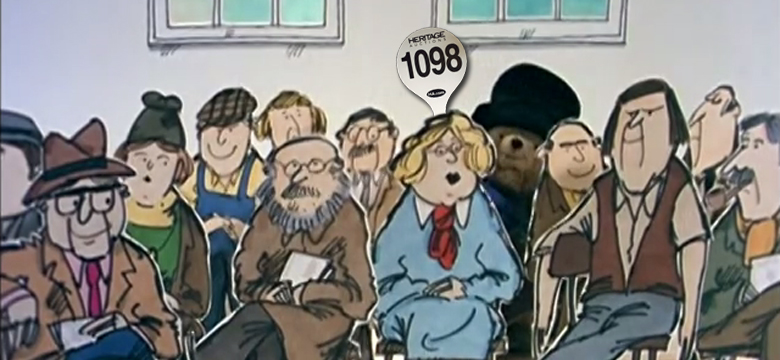Like many little girls, I was once crazy for teddy bears, evidenced by the storage boxes collecting dust in my mother’s attic. Paddington, a “very rare bear” from “Darkest Peru”, was the bear that started it all. As a child, I identified with Paddington Bear because he resembled me: well-intentioned, but out of his depth. His mistakes are learning experiences, and the lessons are good ones. Prompted by the recent movie adaptation, I went back to the original books by Michael Bond and discovered, to my delight, that Paddington still has lessons to teach. I present for your consideration: Paddington’s Guide to Enjoying an Auction.
- Know the rules. When Paddington attends an auction for the first time in Paddington Makes a Bid,[i] he thinks people are waving at the auctioneer out of friendliness. Being a very polite bear himself, Paddington also waves and tips his hat for good measure, which the auctioneer interprets as a bid. Paddington unwittingly wins the lot.
Lesson: Modern auctions typically use bidder cards presented at registration to help auctioneers distinguish between innocent gestures and actual bids. However, ignorance is not bliss. Carefully read the catalogue Terms & Conditions before bidding to learn the sales tax rate, buyer’s premium, shipping options, etc. Remember, you want to be a savvy bidder, not a sorry bidder. Caveat emptor.
- Keep track of your bids. Paddington thinks he’s helping his friend, antique dealer Mr. Gruber, when he raises Mr. Gruber’s bid.
Lesson: Auctions are fast-paced. And people are human. Auctioneers are savvy enough not to accept a raise like Paddington’s, and would courteously remind the him that he is ‘high bidder’ already. These days, however, there are multiple ways of bidding, so you must keep track of your bids. For example, if you are phone bidding live because you’re afraid your prior internet bid might be outbid, don’t authorize your phone agent to start bidding until your prior bid has been exceeded. You don’t want to bid against yourself.
- Stick to your budget (within reason). An antique silver preserves stand in the catalogue catches Paddington’s eye, but he has very little “bun money” left in the secret compartment of his suitcase. He opens the bidding for a modest ten pence, and wins the silver stand worth £50!
Lesson: People can get carried away at auctions. They are very exciting and can bring out our competitive side. But after the adrenaline wears off, reality sets in. You will then have to face your spouse or bank manager and try to make them understand why you needed to spend so much on your hobby.
- Examine the lots. Part of the reason Paddington wins the antique silver stand for ten pence is because the other bidders become suspicious. They think no one would bid so low on a valuable lot unless there was something wrong with it.
Lesson: Knowledge is power. Inspect the lots yourself or ask a knowledgeable friend to evaluate them for you. If this is not an option, carefully read the catalogue descriptions. You may also request additional information by contacting the auction house ahead of time.
- Marmalade tastes better when it is served out of an antique. A connoisseur of marmalade, Paddington’s expert opinion can be taken as gospel.
Lesson: While food may not technically taste better when eaten from antiques, they certainly enhance the fine dining experience, creating a feast for the eyes as well as the taste buds.
[i] Paddington Helps Out, 1960
By Holly Culbreath
